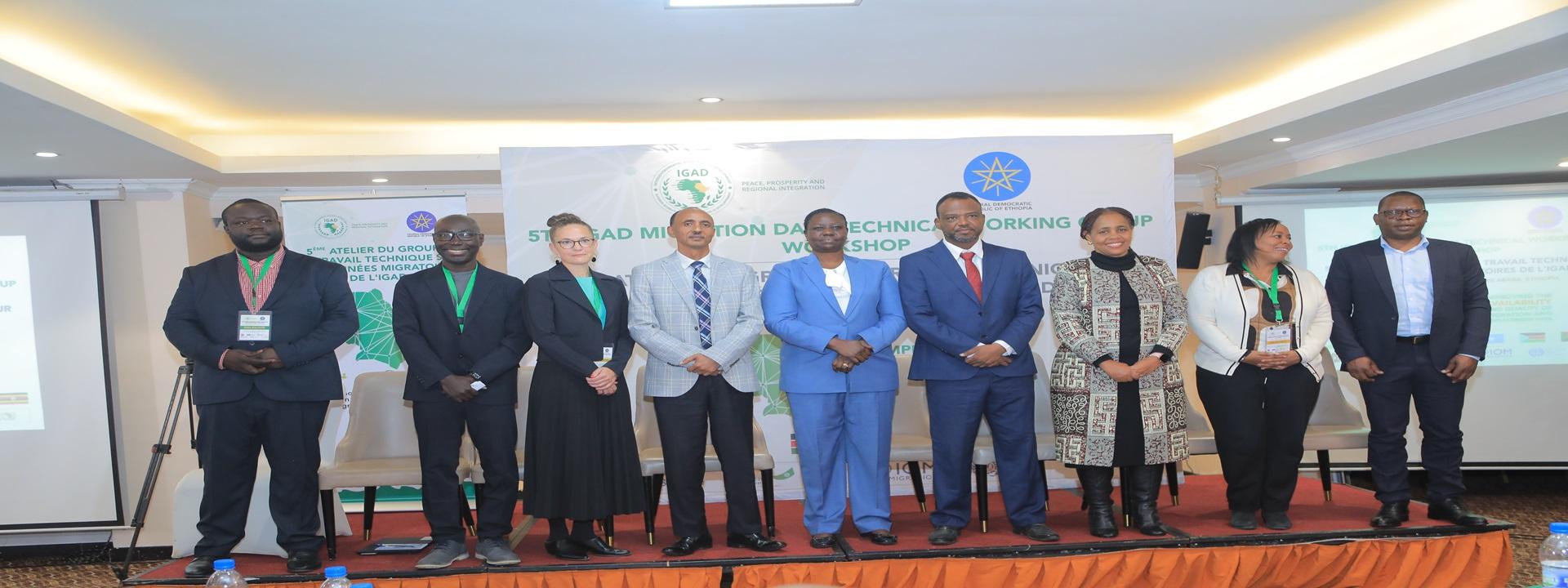(August 15, 2024, Addis Ababa, Ethiopia) The Intergovernmental Authority on Development (IGAD)’s 5th regional workshop of the Technical Working Group on migration data, which was held in Addis Ababa, concluded successfully on Thursday, August 15th providing recommendations for member states, IGAD Secretariat and partners on the way forward on the mainstreaming of migration and displacement statistics in the region.
The 4-days workshop was organized with the aim of improving the availability and quality of migration and displacement statistics within the IGAD region by strengthening national and regional actors in the production and use of migration and displacement statistics.
Speaking on behalf Madam Fathia Alwan, Director of Health and Social Development, IGAD, at the closing of the workshop, Dr. Victoria Anib, Head of Social Development said that harmonization of the migration data will be empower the IGAD to a better understanding of migration formation, policies and coordination.
“I want to emphasis on the importance and commitment demonstrated by each and every one of you towards improvement of migration statement statistics,” she added.
In his closing remarks, Mr. Abdoulkader Daher, Representative of IGAD Chair, the Republic of Djibouti, explained that the second edition of the IGAD Migration Statistics Report provides demographic profiles of the region, including data on population size and density, dependency ratios, the labor force, life expectancy, as well as fertility and mortality rates.
In addition, he asserted that the report should follow international migration aspects in the region, focusing on labor migration, irregular migration, and associated risks of human trafficking.
Participants of the workshop reviewed and provided updates on the implementation of the recommendations from the 4th Technical Working Group workshop, sharing experiences and lessons learnt. Participants also provided inputs in the draft IGAD Regional Harmonization Guidelines and the second edition of the migration statistics report.
Participants also proposed recommendations for the IGAD Secretariat including the need to facilitate stronger collaboration and data sharing among Member States by establishing standardized data collection methods, harmonized definitions, and tools to reduce redundancies, improve data quality and comparability across the region, and create knowledge-sharing platforms.
A number of recommendations were put forward following the discussions and these were specific to Member States, the IGAD Secretariat, regional and international partners.
IGAD Member States were urged to use the regional migration data harmonization guidelines to align with specific national contexts and capacities to enhance relevance and implementation. Member states were also asked to strengthen the capacity of stakeholders involved in migration to improve data collection, management and analysis. Another recommendation to Member States was to expand the membership of the Technical Working Group for Migration and Displacement to include representatives from central banks, refugee commissions, anti-trafficking coordination and disaster risk reduction agencies.
The IGAD Secretariat was also charged with supporting the development and implementation of comprehensive legal frameworks and guidelines to facilitate robust migration data collection, management systems, and bilateral and multilateral data exchanges among Member States.
IGAD was also entrusted with supporting Member States in integrating migration modules into national surveys to capture migration data, including economic activities, skills, and the employment status of migrants for a more comprehensive understanding of migration dynamics in the region;
There were some recommendations too for Partners who have been part of the Technical Working Group discussions including supporting IGAD and member states in leveraging migration and displacement data to inform national policies and programmers in line with broader international frameworks, such as the Global Compact for Migration (GCM) and Agenda 2030.
The workshop was attended by expert from IGAD Members States including representatives from the Ministry of Labour in charge of data and statistics, National Migration Statistics Focal Points, Statistics Officers from the Migration Services; IGAD Migration Statistics report taskforce members and representatives from the Ministry of Foreign Affairs in charge of diaspora affairs. Established focal points of the National Coordination Mechanism (NCM), the central coordinators for migration data at Member State level were in attendance.
Partners were represented by officials in charge of migration issues in international and regional organizations. Experts from IGAD Secretariat’s Migration and Forced Displacement Unit and others the statistics office attended the workshop.
Participants also implored the partners to work with IGAD and Member States to expand the thematic coverage of migration data reports, including emerging migration drivers like climate change and environmental degradation, and to develop and validate specialized data collection tools, including those for remittances, trafficking in persons, and other sources of administrative data.
Through cooperation with the African Union and Statistics Sweden (SCB), and funding from GIZ’s project on Strengthening IGAD Migration Policy Implementation (SIMPI), IGAD has been working to improve the availability and quality of migration and displacement data among stakeholders.
Ends

